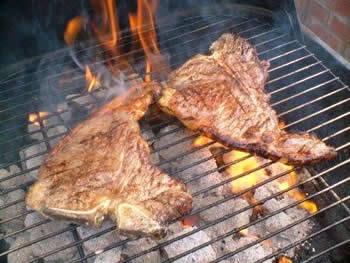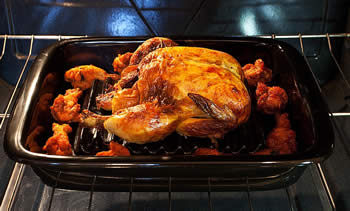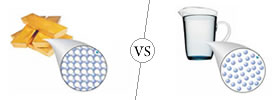Difference between Grilling, Barbecuing and Roasting
Key Difference: Grilling, barbecuing and roasting are all very similar, which is why the confusion between the cooking methods arises. All of them require dry heat to be applied directly to the surface of food. Grilling is generally done "hot and fast", while barbecuing is usually done "low and slow". Roasting is usually done in an oven.

According to professional cooks, there are two main methods of cooking: "dry-heat" or "wet-heat" methods. Wet-heat cooking requires a water-based liquid or steam. Whereas, dry heat cooking method means cooking with heat applied directly to the food. Grilling, barbecuing, and roasting are all some of the dry-heat cooking methods.
Grilling, barbecuing and roasting are all very similar, which is why the confusion between the cooking methods arises. All of them require dry heat to be applied directly to the surface of food.
 Grilling and Barbecue are especially similar as they both are done on open heat or on charcoals. Grilling requires food to be grilled, i.e. cooked on a grill or an open wire grid. Barbecuing is also done on a grill or an open wire grid. However, “grilling is generally done "hot and fast" over direct heat from low-smoke fuels (with the flame contacting the meat itself), while barbecuing is usually done "low and slow" over indirect heat from high-smoke fuels (with the flame not contacting the meat directly).”
Grilling and Barbecue are especially similar as they both are done on open heat or on charcoals. Grilling requires food to be grilled, i.e. cooked on a grill or an open wire grid. Barbecuing is also done on a grill or an open wire grid. However, “grilling is generally done "hot and fast" over direct heat from low-smoke fuels (with the flame contacting the meat itself), while barbecuing is usually done "low and slow" over indirect heat from high-smoke fuels (with the flame not contacting the meat directly).”
Additionally, barbecuing is also done in an outdoor environment by smoking the meat over wood or charcoal. This process generally takes very long, up to 12-16 hours in some cases. Restaurant barbecue may be cooked in large brick or metal ovens specifically designed for that purpose. The term barbecue may also refer to a gathering of family and friends, where food is grilled and/or barbequed and serves.

Roasting, on the other hand, is something else. Roasting is a cooking method that uses dry heat, whether an open flame, oven, or other heat source. However, it differs from grilling and barbecue in one significant manner: it is usually done in an oven, either brick, or commercial home over, rather than open flame. Roasting is especially popular for meats such as chicken or red meat, as well as vegetables, especially fall and winter vegetables. A roast is usually refers to large uncooked cuts of meat. A roast joint of meat can take one, two, even three hours to cook.
Each form of cooking has its own set of advantages and disadvantages. There are all also considered to a healthier option to cooking with oil.
Comparison between Grilling, Barbecuing and Roasting:
|
|
Grilling |
Barbecuing |
Roasting |
|
Description |
Grilling is a form of cooking that involves dry heat applied to the surface of food, commonly from above or below. |
Barbecue is a form of cooking that involves dry heat applied to the surface of food. Barbecuing is usually done "low and slow" over indirect heat from high-smoke fuels. |
Roasting is a cooking method that uses dry heat, whether an open flame, oven, or other heat source. Roasting uses indirect, diffused heat (as in an oven), and is suitable for slower cooking of meat in a larger, whole piece. |
|
Description (TheFreeDictionary) |
To broil on a gridiron. A cooking surface of parallel metal bars; a gridiron. Food cooked by broiling or grilling. |
To roast, broil, or grill (meat or seafood) over live coals or an open fire, often basting with a seasoned sauce. A grill, pit, or outdoor fireplace for roasting meat. |
To cook with dry heat, as in an oven or near hot coals. To dry, brown, or parch by exposing to heat. To expose to great or excessive heat. |
|
Purpose |
Grilling usually involves a significant amount of direct, radiant heat, and tends to be used for cooking meat quickly. |
Grilling usually involves a significant amount of direct, radiant heat, and tends to be used for slowly infusing flavor into the meats. |
Roasting can enhance flavor through caramelization and Maillard browning on the surface of the food. |
|
Equipment |
a grill, a gridiron, a grill pan, or griddle |
barbecue grill, large brick or metal ovens |
open flame, oven, or other source of heat |
|
Temperature |
Temperatures often in excess of 260 °C (500 °F). |
The original technique is cooking using smoke at lower temperatures (usually around 240–280 °F or 115–145 °C). |
A low-temperature oven, 95 °C to 160 °C (200 °F to 325 °F) True roasting temperature is 200 °C (400 °F). |
|
Benefits |
A healthy alternative to cooking with oil, although the fat and juices lost by grilling can contribute to drier food. |
A healthy alternative to cooking with oil. More flavor Smoked flavor |
A healthy alternative to cooking with oil. The resulting meat is tender |
|
Disadvantages |
Studies have shown that cooking beef, pork, poultry, and fish at high temperatures can lead to the formation of heterocyclic amines, benzopyrenes, and polycyclic aromatic hydrocarbons, which are carcinogens (that cause cancer). Marination may reduce the formation of these compounds. |
Time Consuming |
A roast joint of meat can take one, two, even three hours to cook. |
|
Traditional Dishes |
Asado (beef roasted on a fire) Steak a la parrilla (beefsteak cooked on traditional grill) Yakitori (marinated grilled meat on a stick) Grilled bratwurst |
Hibachi Texan Barbecue Ribs Briquette Brisket
|
Filet mignon Strip loin Roast beef Meat Loaf Roasted chicken Roasted squash Roasted potatoes Roasted vegetables |
Image Courtesy: robbwolf.com, planetbarbecue.co.uk, ceramcor.com









Add new comment